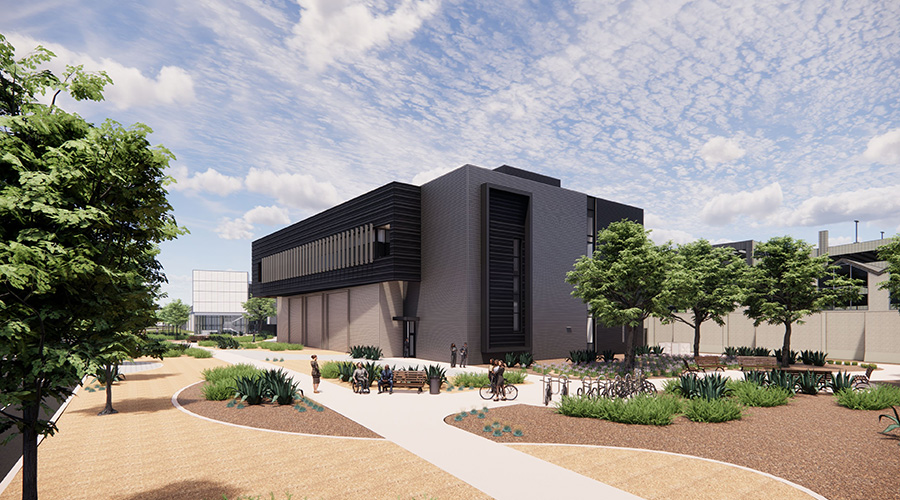Artificial intelligence (AI) is on the rise and is becoming more talked about in the healthcare industry. Similarly, a type of AI called machine learning is working its way into this conversation as well. Machine learning allows software to become more accurate via a learning method akin to how humans learn. With general AI and its facet of machine learning working in tandem, healthcare facilities may be able to harness this technology to streamline their processes.
A primary application is for HVAC and other systems, where AI can provide predictive maintenance in place of preventative maintenance.
Predictive maintenance would predict how a problem could occur before it even does. This capability is further strengthened by machine learning, which allows an AI to use both past data and data from current processes to learn how a system works. From there, it can pinpoint potential issues based on what it has learned from the data made available to it.
“Where I see AI really making an impact is giving a better understanding of your overall system health, which is more cost effective than how preventive maintenance is done today,” says Alison Flynn Gaffney, president of the healthcare division at JLL. “In many cases, preventative maintenance is scheduled and sometimes not needed, however, it is done to tick a box and of course regulatory requirements. That can be costly, but AI and some of the more predictive methodologies can give you a better idea of when maintenance is actually needed, saving on overall maintenance costs.”
Additionally, AI can draw from other sources for its data. These sources can be:
- Building automation systems
- Occupancy sensors
- Patient health records
- Various Internet of Things (IoT) devices
After collecting information from these sources, AI can use machine learning to gain a comprehensive understanding of a healthcare facility’s myriad systems. Equipped with that information and understanding, AI can then further improve processes not only for the facility’s systems, but for facility staff as well. One key area it can aid in is communication.
Good communication is critical to any facility’s functioning. However, where there is poor communication between teams, there is dysfunction. To prevent this or at least mitigate it, AI helps these teams connect to each other through the integration of separate parts. Basically, just as AI integrates aspects of different systems within a healthcare facility into one nexus, so does it with the people running the facility.
“If you can take the integration of your IT systems, your FM systems and HR, these are incredibly important given the high merger and acquisition activity we have right now in the healthcare industry,” says Gaffney. “Just from a communication standpoint, the learning that happens between those three functions being connected and learning from one another creates better team outcomes and better communication models.”
Even with the potential benefits of AI and machine learning, there are concerns. Namely, security of private information and the level of change caused by AI.
Gaffney says that using certain private information (such as patient health records) will have to be done mindfully and thoughtfully. She adds that since the various systems within a healthcare facility speak to each other, diligence will be crucial to appropriate use of this information.
Then there is the level of change caused by the implementation of AI itself, which is going to be difficult to accurately predict. It could cause a great magnitude of change in not only the facility management part of healthcare, but healthcare as a whole. In this scenario, there will be many who are unprepared to handle and adapt to the changes.
However, this scenario can be avoided. Healthcare facilities can prepare their staff for possible changes, for example, making the staff aware of what is coming and what they can do to navigate this new frontier.
“One of the larger risks that we do not talk enough about is the whole change management process and how quick everything happens,” says Gaffney. “Are we bringing our teams along in that process and are we bringing along the public, patients, and our cultures that support that? We need to make sure we do not forget those communities along the journey, we do not change for change’s sake.”
While AI is at the forefront of the conversation and will bring changes in time, these changes need not be feared nor downplayed. AI can be a great boon for healthcare and other industries, changing the way things work entirely in some cases. Though, the concerns people have are real. How these concerns will be addressed will depend upon the facility and its own circumstances.
“There is an unreal fear regarding AI in healthcare, or in any industry, that it is going to truly replace all humans and jobs," says Gaffney. “I believe in healthcare and facilities management that is not what AI is going to do. It is going to enhance and evolve the job of the facilities manager and the facilities management team. It will be more of a collaboration and strategy tool to help those individuals be more focused and working at the top of their license.”
Jeff Wardon, Jr. is the assistant editor for the facilities market.

 Grounding Healthcare Spaces in Hospitality Principles
Grounding Healthcare Spaces in Hospitality Principles UC Davis Health Selects Rudolph and Sletten for Central Utility Plant Expansion
UC Davis Health Selects Rudolph and Sletten for Central Utility Plant Expansion Cape Cod Healthcare Opens Upper 2 Floors of Edwin Barbey Patient Care Pavilion
Cape Cod Healthcare Opens Upper 2 Floors of Edwin Barbey Patient Care Pavilion Building Sustainable Healthcare for an Aging Population
Building Sustainable Healthcare for an Aging Population Froedtert ThedaCare Announces Opening of ThedaCare Medical Center-Oshkosh
Froedtert ThedaCare Announces Opening of ThedaCare Medical Center-Oshkosh